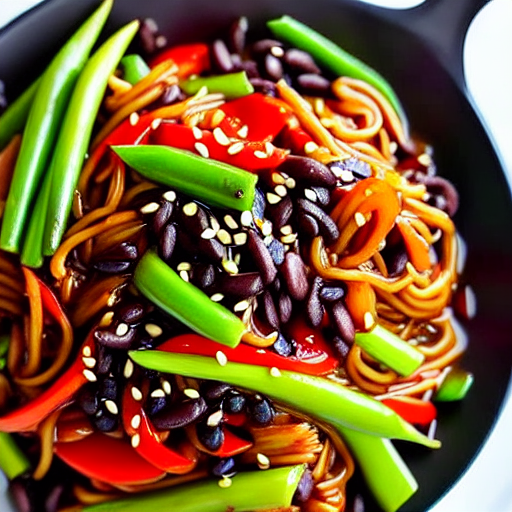Vegetable Jjajangmyeon
Vegetable Jjajangmyeon is a savory, vegan twist on the classic Korean noodle dish, featuring a rich black bean sauce paired with an assortment of fresh vegetables. It's a hearty and satisfying meal that's perfect for dinner any night of the week.

30 minutes
Difficulty: Medium
Korean
480 kcal
Ingredients
- Chunjang (Korean black bean paste) - 3 tablespoons
- Soy sauce - 1 tablespoon
- Sugar - 1 teaspoon
- Sesame oil - 1 tablespoon
- Garlic, minced - 2 cloves
- Ginger, minced - 1 teaspoon
- Vegetable broth - 200 ml
- Potato, diced - 100 grams
- Carrot, julienned - 50 grams
- Zucchini, julienned - 100 grams
- Onion, diced - 1 medium
- Green bell pepper, diced - 1 small
- Cabbage, shredded - 100 grams
- Cornstarch - 1 tablespoon
- Water - 2 tablespoons
- Fresh chives, chopped - for garnish
- Cooked noodles (jjajangmyeon noodles or udon) - 200 grams
Steps
- In a large pan, heat the sesame oil over medium heat. Add the minced garlic and ginger, and stir-fry until fragrant, about 1 minute.
- Add the diced onion and cook until translucent, about 3-4 minutes.
- Stir in the chunjang (black bean paste) and cook for another 2 minutes, allowing it to caramelize slightly.
- Add the potato, carrot, zucchini, green bell pepper, and cabbage to the pan. Stir well to combine and cook for about 5 minutes, until the vegetables start to soften.
- Pour in the vegetable broth, soy sauce, and sugar. Bring the mixture to a gentle simmer and let it cook for about 10 minutes, until the vegetables are tender.
- In a small bowl, mix the cornstarch with water to create a slurry. Gradually add this to the pan while stirring to thicken the sauce. Cook for an additional 2-3 minutes.
- While the sauce is thickening, prepare the cooked noodles according to the package instructions. Drain and set aside.
- To serve, place the noodles in a bowl and ladle the vegetable jjajang sauce over the top. Garnish with fresh chives.
Nutrition
- Calories: 480
- Protein: 14 g
- Carbs: 80 g
- Fiber: 8 g
- Sugar: 6 g
- Sodium: 700 mg
- Cholesterol: 0 mg
- Total Fat: 10 g
- Saturated Fat: 1 g
- Unsaturated Fat: 9 g
- Water: 0.5 L
Health Benefits
- Rich in fiber from vegetables, promoting digestive health.
- Low in cholesterol as it is a plant-based dish, supporting heart health.
Tags
KoreanVeganDinner